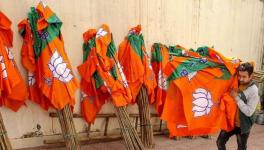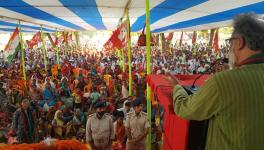Konar -- The First Village to Spur Liquor Ban Protests Demystifies Dry Bihar’s Reality
Konar Village
That Chief Minister Nitish Kumar is a votary for liquor prohibition in Bihar is a phenomenon known to all. However, in the midst of the upcoming Assembly elections, his decision to enforce liquor prohibition needs evaluation as this is the first Assembly election since Bihar was declared a dry state in April 2016.
As the first phase of Assembly election (October 28) is approaching, the Election Commission has directed the state excise department to check illegal liquor flow to influence voters. In this backdrop, let’s take a look a the ground reality in one village in Rohtas district, which is said to have spurred the demand for a state-wide liquor ban.
Konar village, located 12 km away from Sasaram district headquarters, was the first rural hamlet that voiced the demand to make Bihar a teetotaller state. It was on Holi eve in March 2013, when 200 women of Konar marched to the nearest liquor shop in the local market and destroyed bottles worth lakhs of rupees. This was the first move against rampant alcoholism that later took the form of a huge social movement demanding booze ban. Konar , where about 1,500 families live, became the epicentre of the protests till liquor prohibition became a law.
Going back on memory lane, Sunita Devi, the founder of Pragatisheel Mahila Manch (PMM), a social platform floated by women against alcoholism, in conversation with NewsClick, said: “We were the first to resist abuse and domestic violence against women perpetuated by drunken men who used to enter homes at the end of the day. The organisation came into existence in the aftermath the 2012 Nirbhaya gangrape case in Delhi with an aim to raise issues related to women’s safety at the local level.
Sitabigha, the neighbouring village of Konar, under the Shivsagar block, reportedly has over 100 widows, who lost their husbands to excessive liquor consumption. Eve-teasing of girls and women by drunkards in broad daylight had become a norm. Liquor shops located opposite of coaching institutes and schools created an unpleasant and unacceptable environment for girls. “The crime-laden scenario and deteriorating societal norms forced us to launch a fight against alcoholism,” said Sunita.
The women-led anti-liquor protests in Konar gave impetus to a state-wide demand for prohibition which quickly spread to adjoining villages of Sasaram, including Karwandia, Sitabigha, Belwa and Basa.
In July 2015, while campaigning for the upcoming state elections later that year, incumbent Chief Minister Nitish Kumar assured women that he would impose a liquor ban if brought to power. Once re-elected, he announced liquor prohibition in April 2016, first with draconian clauses against anti-liquor law offenders. Later, the Patna High Court’s intervention forced the Nitish Kumar government to dilute some of the contentious clauses.
Four years down the line, the outcome of the liquor ban under the Bihar Excise and Prohibition Act, 2016, on ground in the village that spearheaded the anti-liquor protests seems to be more troublesome than desired.
Some of the women in Konar village who spearheaded protest against liquor ban
The group of women who smashed a liquor shop in their village in 2013, now say that the ban had only provided namesake benefits.
Manorama Devi, 24, said getting beaten up by our men was no longer a daily affair and had turned sporadic. Physical abuse does not happen every now and then, but illicit liquor supply is bringing back past inconveniences, such as economic backwardness, she said.
“ We struggle to save the monthly earnings as it gets wasted in drinking, but this doesn’t happen openly due to fear of law. Liquor trade and consumption continue in the village and a large chunk of unemployed individuals are involved in its trafficking,” she added.
Shanti Devi, 55, a resident of Konar confessed that her husband who works as security guard in a marriage hall in Sasaram town, returns home drunk. “Verbal spats and physical scuffles continue to haunt my family because hard earned money is illegitimately being spent on double rated booze bottles,” she said.
The Manch’s founder, Sunita, explained that liquor prohibition as a panacea had fractionally favoured women in the form of less complaints of domestic abuse, but its continued availability had uncapped the economical outflow of low-income groups.
The (women) who spearheaded the ban on liquor hail from dalit communities. They made a historical intervention against an existing evil and should have been recognised by the government, but this did not happen. “Their unsung heroic deeds seem to be going in vain as we find a massive network of young bootleggers across the region undoing our hard work,” she adds.
Kedar Pandey, 60, a local, who also is the caretaker at former health expert-turned poll strategist Prashant Kishor’s paternal home in Konar, told NewsClick that 2013 was “a big breakthrough for us as women of Konar revolted against rampant alcoholism”. However, the “brazenly pressed policy” has led to burgeoning business of illicit liquor. Be it IMFL (Indian Made Foreign Liquor) or country liquor, drinkers do not miss drinking. Moreover, liquor recovery by Bihar police reflects the growing parallel illegal market of liquor despite the ban.
Rohtas has made to the list of law-offending regions of Bihar where police officials were found guilty for violating the liquor ban law. In March this year, a sub-inspector of Nokha police station in Rohtas was arrested for alleged links with illicit liquor smugglers. In 2017, four deaths in a village were reported after consumption of spurious liquor.
Hefty bribes and favours to police officials by the liquor mafia and bootleggers has been nurturing the illegal trade and, as per the police headquarters, between April 2016 to January 2020, disciplinary action was initiated against 517 officials (including policemen), 454 were suspended, 73 officials were dismissed, 44 policemen had FIRs against them and 10 inspectors were prohibited from SHO posting for 10 years.
Commenting on liquor ban, Nawal Kumar Chaudhary , a Patna-based economist and former professor in Patna University, said Nitish Kumar remains vocal about the social benefits that partly exists due to the liquor ban but is ignoring the mounting social costs that are irreversible, as also the loss of Rs. 5,400 crore to state exchequer.
The writer is a freelance journalist based in Bihar.
Also Read:Ahead of Holi, Dry Bihar Sees Spike in Liquor Demand
Get the latest reports & analysis with people's perspective on Protests, movements & deep analytical videos, discussions of the current affairs in your Telegram app. Subscribe to NewsClick's Telegram channel & get Real-Time updates on stories, as they get published on our website.
























